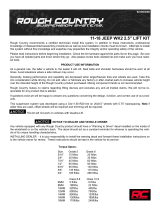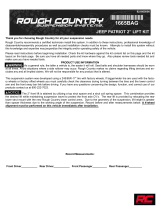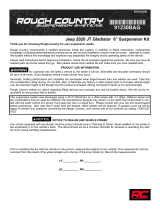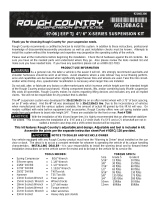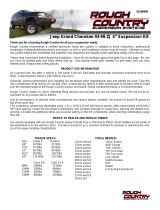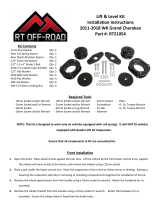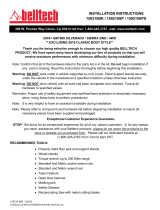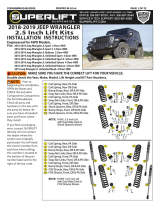Page is loading ...

Torque Specs:
Size Grade 5 Grade 8 Size Class 8.8 Class 10.9
5/16” 15 ft/lbs 20ft/lbs 6MM 5ft/lbs 9ft/lbs
3/8” 30 ft/lbs 35ft/lbs 8MM 18ft/lbs 23ft/lbs
7/16” 45 ft/lbs 60ft/lbs 10MM 32ft/lbs 45ft/lbs
1/2” 65 ft/lbs 90ft/lbs 12MM 55ft/lbs 75ft/lbs
9/16” 95 ft/lbs 130ft/lbs 14MM 85ft/lbs 120ft/lbs
5/8” 135ft/lbs 175ft/lbs 16MM 130ft/lbs 165ft/lbs
3/4” 185ft/lbs 280ft/lbs 18MM 170ft/lbs 240ft/lbs
JEEP 2016-20 WK2 2.5” Strut and Coil Kit
921914300
Rough Country recommends a certified technician install this system. In addition to these instructions, professional
knowledge of disassemble/reassembly procedures as well as post installation checks must be known. Attempts to install
this system without this knowledge and expertise may jeopardize the integrity and/or operating safety of the vehicle.
Please read instructions before beginning installation. Check the kit hardware against the parts list on this page. Be sure
you have all needed parts and know where they go. Also please review tools needed list and make sure you have need-
ed tools.
PRODUCT USE INFORMATION
As a general rule, the taller a vehicle is, the easier it will roll. Seat belts and shoulder harnesses should be worn at all
times. Avoid situations where a side rollover may occur.
Generally, braking performance and capability are decreased when larger/heavier tires and wheels are used. Take this
into consideration while driving. Do not add, alter, or fabricate any factory or after-market parts to increase vehicle height
over the intended height of the Rough Country product purchased. Mixing component brands is not recommended.
Rough Country makes no claims regarding lifting devices and excludes any and all implied claims. We will not be respon-
sible for any product that is altered.
If questions exist we will be happy to answer any questions concerning the design, function, and correct use of our prod-
ucts.
This suspension system was developed using a 33x11.50-R20 tire on 20x8.5” wheels with 5.75” backspacing. Note if
wider tires are used, offset wheels will be required and trimming will be required.
This kit will not work on vehicles with Quadra-Lift.
NOTICE TO DEALER AND VEHICLE OWNER
Any vehicle equipped with any Rough Country product should have a “Warning to Driver” decal installed on the inside of
the windshield or on the vehicle’s dash. The decal should act as a constant reminder for whoever is operating the vehi-
cle of its unique handling characteristics.
INSTALLING DEALER - it is your responsibility to install the warning decal and forward these installation instructions on
to the vehicle owner for review. These instructions should be kept in the vehicle for its service

KIT CONTENTS:
Loaded Front Struts x2
Rear Coil Springs x2
Rear Shocks x2
TOOLS NEEDED:
8mm Wrench and Socket
10mm Wrench and Socket
13mm Wrench and Socket
15mm Wrench and Socket
18mm Wrench and Socket
19mm Wrench and Socket
21mm Wrench and Socket
22mm Wrench and Socket
24mm Wrench and Socket
32mm Socket
Hammer

1. Jack up the front of the vehicle and support the vehicle with jack stands, so that the front wheels are off the ground.
Chock rear wheels.
2. Remove the front tires/wheels, using a 22mm deep well socket.
3. Using a 13mm socket, remove the front skid plate. Retain hardware.
4. Unplug the electric power steering.
5. Using a 21mm wrench, loosen the tie rod end nut. Do not completely remove. See Photo 1.
6. Using a hammer, hit the knuckle at the tie rod end to release the taper. Remove and retain hardware for reuse. See
Photo 2.
7. Using a 19mm wrench and an 8mm socket, remove the sway link from the sway bar. Retain hardware for reuse.
See Photo 3.
8. Using a 21mm wrench, loosen the upper ball joint nut. Do not completely remove. See Photo 4.
9. Using a hammer hit the knuckle at the upper ball joint to release the taper. Remove the nut and retain for reuse.
See Photo 5.
Photo 1 Photo 2
Photo 3 Photo 4
Photo 5 Photo 6
Loosen tie rod end nut. Release the taper.
Remove the sway link. Loosen upper ball joint nut.
Release the taper. Remove the ABS sensor.
FRONT INSTALLATION INSTRUCTONS

10. Using a 10mm socket, remove the ABS sensor from the knuckle. Retain the hardware for reuse. See Photo 6.
11. Using a 21mm socket, remove the brake caliper and hang caliper out of the way. Retain hardware for reuse. Do not
hang caliper by the brake line. See Photo 7.
12. Remove the rubber O-ring from the hub and remove the brake rotor. Retain O-ring for reuse. See Photo 8.
13. Using a 32mm socket, remove the axle nut. Retain nut for reuse. See Photo 9.
14. Using a 24mm wrench and an 8mm Allen, remove the lower ball joint nut. See Photo 10.
15. Remove the knuckle from the Jeep.
16. Using 21mm and 24mm wrenches, remove the lower strut hardware. Retain the hardware for reuse. See Photo 11.
17. Some models require removal of an electrical relay on the pass side. Remove the plastic cover and use a 10mm
socket to unbolt the assembly. Unclip the harness and move until upper strut nuts are accessible.
18. Using a 13mm socket, remove the upper strut hardware from under the hood. Retain hardware for reuse. See Pho-
to 12.
19. READ ENTIRE STEP: Slightly pull the axle out of the diff housing and rest on the lower control arm.
TAKE CARE TO NOT DAMAGE THE BOOT.
Photo 7 Photo 8
Photo 9 Photo 10
Photo 11 Photo 12
Remove brake caliper. Remove hub O-ring.
Remove axle nut. Remove lower ball joint nut.
Remove lower strut bolt. Remove upper strut nuts.

Photo 18
Secure the strut using the OE hardware.
20. Remove the axle and strut together to prevent strut fork from damaging CV boot.
21. Step 22 Take care not to damage the axle boot when installing the strut and axle.
22. Install the assembled strut in to the upper strut mount and the axle together to prevent the fork from damaging the
axle boot. Secure the strut using the retained OE hardware. Tighten using a 13mm socket. See Photos 17 and 18.
23. Install the knuckle on the lower ball joint and tighten using a 24mm wrench and an 8mm Allen.
24. Install the axle nut and torque to factory specs using a 32mm socket.
25. Install the brake rotor and O-ring.
26. Install the brake caliper using the factory hardware. Torque to factory specs using a 21mm socket.
27. Install the ABS sensor into the knuckle using a 10mm socket.
28. Install the upper ball joint into the knuckle and tighten using a 21mm wrench.
29. Install the sway link into the sway bar using the factory hardware. Tighten using a 19mm wrench and an 8mm sock-
et.
30. Install the tie rod end into the knuckle and tighten using a 21mm socket.
31. Repeat steps 5-30 on opposite side of the vehicle.
32. Connect the electric power steering plug.
33. Install the factory skid plate using the factory hardware, torque to factory specs using a 13mm socket.
34. Install the wheels and tires and lower the vehicle to the ground.
Photo 17
Install the strut into the upper strut mount.

Rear Installation
1. Chock the front wheels of the vehicle. Using a jack lift the rear of the of the vehicle up and insert jack stands in a
safe location under the vehicle for disassembly. Lower the vehicle onto the jack stands and remove the jack.
2. Using an 18mm wrench and socket, remove the tow bar from the knuckle. See Photo 1.
3. Using 18mm and 8mm wrenches, remove the sway link from the sway bar. Retain hardware. See Photo 2.
4. Using an 18mm wrench and socket, remove the 2 upper control arms from the knuckle. Retain hardware. See Pho-
to 3.
5. If applicable, remove the ride height sensor linkage using a 10mm wrench.
6. Using a 10mm socket, remove the ABS line from the brake caliper and hang out of the way.
7. Place a jack under the lower control arm to support it.
8. Using 21mm and 24mm wrenches, remove the lower shock hardware. Retain hardware. See Photo 4.
9. Mark the position of the coil spring in relation to the vehicle body and upper coil spring isolator.
10. Slowly lower the jack and remove the coil spring. See
Photo 5.
11. Remove the lower coil isolator from the lower control arm
by pushing in on the clips from the underside. Note the
position of the lower isolator in the lower control
arm as the new supplied spacer will be oriented
the same, in step 14.
Photo 1 Photo 2
Remove the toe link. Remove sway link.
Remove upper control arms. Remove lower shock hardware,.
Remove the coil spring.
Photo 3 Photo 4
Photo 5

12. Remove the push pins from the inner fender just behind the shock. See Photo 6.
13. Using a 15mm socket, remove the upper shock bolts. Retain hardware for later use. See Photo 7.
14. Install the isolators onto the top and bottom of the coil spring. See Photo 8.
15. Install the new coil spring into the vehicle. See Photo 9.
16. Remove the bushing cover off of the top of the shock. Retain for later use. See Photo 10.
17. Using a 18mm socket remove the nut from the top bushing end of the shock. See Photo 11.
Photo 6 Photo 7
Photo 8 Photo 9
Photo 10 Photo 11
Remove push pins from inner fender liner. Remove the upper shock hardware.
Install the coil spring isolators Install the coil spring.
Remove the bushing cover. Remove the nut from the top of the shock.

18. Remove the top shock mount and the bump stop from the shock. Retain for later use. See Photo 12.
19. Install the bump stop and the top mount onto the new shock. Tighten using a 18mm socket. See Photo 13.
20. Install the bushing cover onto the mount. See Photo 14.
21. Install the shock into the stock location using the retained hardware. Tighten using a 15mm socket. See Photo 15.
22. Install the shock on the lower control arm. Torque to factory specs using a 24mm wrench and 21mm socket. See
Photo 16.
23. Attach the sway link to the sway bar using the factory hardware. Tighten using 18mm and 8mm wrenches See
Photo 17.
Photo 12 Photo 13
Photo 14 Photo 15
Photo 16 Photo 17
Remove the top mount and bumpstop. Install the bumpstop and the top mount.
Install the bushing cover. Install the shock into the stock location.
Install shock on lower control arm. Attach sway link to sway bar.

24. Install the upper control arms using the factory hardware. Torque to factory specs using an 18mm wrench and sock-
et. See Photos 18 & 19.
25. Install the toe link using the factory hardware. See Photo 20.
26. Repeat process on opposite side of the vehicle.
27. Install the wheels and tires.
28. Using a jack lift the vehicle up and remove the jack stands then lower the vehicle to the ground.
29. Remove front wheel chocks.
Photo 20
Photo 18 Photo 19
Install toe link.
Install upper control arms. Install upper control arms.

POST INSTALLATION INSTRUCTIONS
1. Check all fasteners for proper torque. Check to ensure for adequate clearance between all rotating, mobile, fixed,
and heated members. Verify clearance between exhaust and brake lines, fuel lines, fuel tank, floor boards and wiring
harness. Check steering gear for clearance. Test and inspect brake system.
2. Perform steering sweep to ensure front brake hoses have adequate slack and do not contact any rotating, mobile or
heated members. Inspect rear brake hoses at full extension for adequate slack. Failure to perform hose check/ re-
placement may result in component failure.
3. On some vehicles the front lower skirting will need to be trimmed if using certain wheel /tire combinations and with
heavy offset wheels. Trim only as needed.
4. Activate four wheel drive system and check front hubs for engagement.
5. Have a qualified alignment center align the vehicle immediately. Realign to factory specifications. The following are
the recommended specifications:
Caster in degrees +6.95° +-.50°
Camber in degrees -.38° +-.50°
Toe In in degrees +0.1 +-.06°
6. Perform head light check and adjustment to proper settings.
7. Check and retighten wheels at 50 miles and again at 500 miles.
8. All kit components must be retightened at 500 miles and then every three thousand miles after installation. Periodi-
cally check all hardware for tightness.
9. Install “Warning to Driver” decal on sun visor
Note: Installation of larger tires will require speedometer recalibration.
By purchasing any item sold by Rough Country, LLC, the buyer expressly warrants that he/she is in compliance with all
applicable, State, and Local laws and regulations regarding the purchase, ownership, and use of the item. It shall be the
buyers responsibility to comply with all Federal, State and Local laws governing the sales of any items
listed, illustrated or sold. The buyer expressly agrees to indemnify and hold harmless Rough Country,
LLC for all claims resulting directly or indirectly from the purchase, ownership, or use of the items.

/
